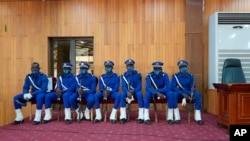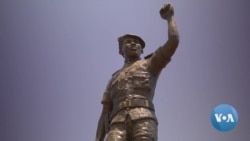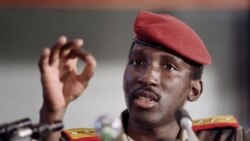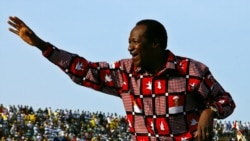A trial on the assassination of Burkina Faso’s former president, Thomas Sankara, begins Monday, more than three decades after he and 13 others were killed in a 1987 coup. Former President Blaise Compaore, the main defendant in the trial, who lives in exile in Ivory Coast, will not be present at the military court in Ouagadougou.
Sankara is still considered a national hero in Burkina Faso.
Alouna Traore is the lone survivor of an attack that killed former Sankara and 12 others in October 1987. Traore, Sankara’s legal adviser, remembers the day of the assassination.
He says the president got up, adjusted the tracksuit he was wearing and told the other meeting attendees that he was the one the attackers were looking for. He went out the same door he came in. He walked out of the room with his hands up and headed outside, carrying no weapon.
Sankara was a popular figure whose influence was felt across West Africa and beyond.
“He came to be known by some people as the Che Guevara of West Africa… with a big focus on grassroots issues, so really focusing on the well-being of ordinary people,” said Paul Melly, an analyst at Chatham House, a U.K. policy institute.
Fourteen defendants stand accused of carrying out the assassination or conspiring to, including former top-ranking military officials and former politicians.
Compaore was ousted in a coup in 2014 after 27 years of rule and has been in exile in Ivory Coast ever since. His lawyers denounced the trial as "political" last week.
A previous trial for the Sankara assassination was held under Compaore’s rule, but that judgment was dismissed as politicized and invalid by the transitional government after Compaore was ousted.
Prosper Farama is one of the lawyers for the Sankara family. He expects the trial to last four months and says the Sankara family lawyers have amassed irrefutable evidence implicating the defendants.
He says there are many witnesses who will be heard from the military, civilians, politicians of the time. … For example, the driver who drove the commandos to the execution, is alive and able to give clear testimony, according to Farama.
Maitre Mathieu Some is representing one of the defendants, Gilbert Diendere.
He thinks the trial is being held in a context that makes the work of judges difficult, a context in which there are prejudices. He says people have already made up their minds about who carried out the assassination, which jeopardizes the presumption of innocence — the main principle of a fair trial, as far as he is concerned.
Nonetheless, the trial has gripped the country. Traore as well as the families of those killed hope to receive justice 34 years later.








